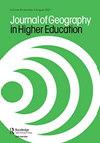Obtaining geographical competences through online cartography of familiar and unfamiliar urban heritage: lessons from student workshops
IF 1
4区 教育学
Q2 EDUCATION & EDUCATIONAL RESEARCH
引用次数: 2
Abstract
In times of the COVID-19 pandemic, teachers on all levels have had to adapt to an online or hybrid teaching environment. People in geography, a discipline that traditionally values field trips to connect theory to practice, have had to find online alternatives for educational activities that normally would have taken place in the field. This has led to several innovative practices, which, however, have only to a limited degree been purposively tested for efficacy because of the ad-hoc, enforced nature of the required changes. This project deals with this issue by studying, through student workshops dealing with the creation of online didactic walking routes in two cities, how students can obtain specific geographical competences such as interpreting different historical layers that collectively shape the current urban fabric through online cartography. We found that students reported clear improvements in geographical reasoning skills, regarding both GIS and heritage interpretation. There were no clear patterns regarding the role of familiarity with the studied city for the quality of the produced story maps. On final reflection, we argue that online cartographic exercises are a valuable addition to the geographers' educational toolkit to bounce forward to a more resilient, reflective educational practice after the pandemic.通过熟悉和不熟悉的城市遗产的在线制图获得地理能力:来自学生研讨会的经验教训
在2019冠状病毒病大流行期间,各级教师都不得不适应在线或混合教学环境。地理是一门传统上重视实地考察以将理论与实践联系起来的学科,研究地理的人不得不在网上寻找通常在实地进行的教育活动的替代方案。这导致了一些创新的做法,然而,由于所要求的改变具有临时和强制的性质,这些做法只在有限的程度上进行了有目的的有效性测试。该项目通过研究两个城市在线教学步行路线的学生工作坊来解决这个问题,学生如何获得特定的地理能力,例如通过在线制图来解释不同的历史层面,这些层面共同塑造了当前的城市结构。我们发现,在地理信息系统和遗产解释方面,学生报告了地理推理技能的明显提高。对于所研究城市的熟悉程度对制作的故事地图的质量的作用,没有明确的模式。在最后的反思中,我们认为,在线制图练习是地理学家教育工具包的宝贵补充,可以在大流行之后向更具弹性和反思性的教育实践发展。
本文章由计算机程序翻译,如有差异,请以英文原文为准。
求助全文
约1分钟内获得全文
求助全文
来源期刊

Journal of Geography in Higher Education
Multiple-
CiteScore
5.80
自引率
9.50%
发文量
29
期刊介绍:
The Journal of Geography in Higher Education ( JGHE) was founded upon the conviction that the development of learning and teaching was vitally important to higher education. It is committed to promote, enhance and share geography learning and teaching in all institutions of higher education throughout the world, and provides a forum for geographers and others, regardless of their specialisms, to discuss common educational interests, to present the results of educational research, and to advocate new ideas.
 求助内容:
求助内容: 应助结果提醒方式:
应助结果提醒方式:


